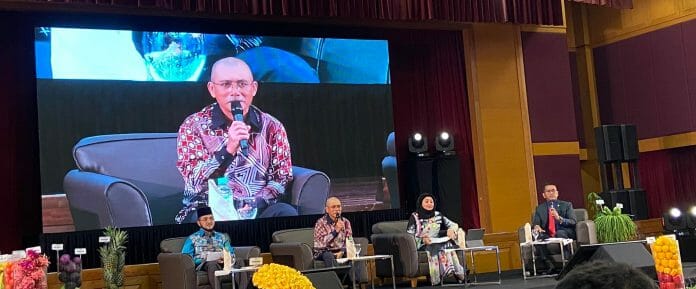The Ministry of Agriculture and Food Industry (MAFI) remains committed to strengthening the National Food Security agenda by holding the Agro-Food Industry Dialogue 2022 program.
The dialogue themed “Modernization and Productivity to Ensure Food Security” was held to identify the agro-food sector, especially aspects of food security, and take appropriate intervention measures according to current, comprehensive, and holistic developments in efforts to strengthen the country’s agro-food sector.
Moreover, this theme is seen in line with the emphasis given through implementation of the National Agro-Food Policy (DAN 2.0) 2021-2030 which, among others, emphasizes on the modernization of the sustainable, resilient, and high-tech agricultural sector.
A total of 200 participants physically and 1,000 people through Webinar/Facebook Live attended and participated in this dialogue program which consisted of players in the agro-food sector covering the sub-sectors of paddy, crops, livestock, fisheries, and the entire agro-food chain including associations and players. industries involved along the agro-food sector value chain such as representatives of producers, leading companies, importers, and exporters, as well as industry representatives who are actively involved in marketing and processing networks.
Apart from the agro-food industry players, this dialogue session also involved the involvement of departments and agencies under MAFI as well as invitations from other ministries, departments, and agencies interested in the agro-food sector.
“The Agro-Food Industry Dialogue 2022 is one of MAFI’s initiatives, a two-way communication platform directly with industry players in line with the whole of government and whole of society approach to share ideas, views, suggestions, and government direction as well as strengthen cooperation and good relations. MAFI continues to strengthen the best service delivery system to the people of Siring with current needs especially through target groups such as farmers, ranchers, and fishermen sera all industry players along its value chain, said Dr Ronald.
“In addition, the Dialogue initiative is able to identify agro-food sector issues, especially aspects of food security before appropriate intervention measures are taken according to current developments, comprehensive and holistic in an effort to further strengthen the agro-food sector and ensure food security,” said Dr Ronald.
According to Dr Ronald, reviewing the performance of the past decade, the agro-food sector continues to maintain resilience, and its contribution to Gross Domestic Product (GDP) continues to increase from RM26.6 billion in 2010 to RM51.3 billion in 2020.
‘Nevertheless, to meet the needs of the population, the country in fact still has to rely on imports of some major food commodities such as rice, vegetables, and meat to ensure adequate supply at all times,’ he explained.
Dr Ronald added that we also face the challenges of climate change which will affect the sustainability of natural resources for agricultural activities. Thus, the level of technology adoption and automation among entrepreneurs needs to be increased, complemented by private investment in research, development, commercialization, and innovation to drive the growth of the agro-food sector.
For the record, initial engagement sessions with industry players were held to identify the key issues of each sub-sector and propose solutions. Among the issues raised were related to subsidies/incentives, Smart Large Scale Paddy Fields (Smart SBB), paddy crop management, Integrated Pest Management technology approach, swiftlet nest industry development, industrial development downstream, foreign labor management, certification, labor force, licensing, foreign crew importation, Temporary Occupancy License (TOL) land, marketing and price increases of inputs, food, and equipment.
The COVID-19 pandemic and the flood disaster have tested the strength of the country’s food system in overcoming economic shocks and uncertainties. Food production activities also could not be carried out optimally due to time and manpower constraints resulting in huge losses. The spillover effects on the entire food chain of the country’s food system and food security have seen many new norms have to be implemented and new approaches are needed to ensure a smooth food supply chain at all times.









